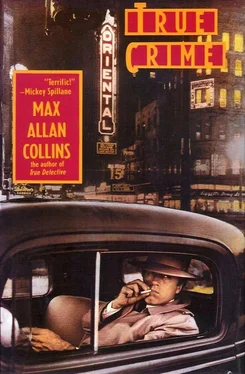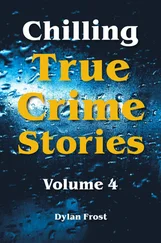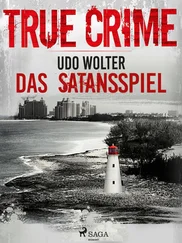He smiled. “A newsman knows he’s doing a good job when people resent him. You can’t hurt my feelings, Heller, don’t even bother trying.”
“You’re short.”
He stopped smiling. “ You get fucked, Heller.”
I gulped my milk. “Every rag in town this morning, including yours, had a dozen eyewitness accounts of the Biograph shooting. This is old news. Why bother?”
Davis waved that off. “Dillinger dying’s gonna be front-page fodder for days, maybe weeks. Besides, the bozos we got eyewitness stories from came in after the show started; you were there for the whole picture, and the featured attractions to boot.”
“What’s in it for me?”
He shrugged facially, “How ’bout a double sawbuck.”
“I don’t think so, Davis.”
“What do you want?”
My curiosity got the better of me. “Were you at the inquest?”
“Yeah,” he said, shrugging, with his body this time.
“Anything interesting come out?”
“What’s interesting is what didn’t come out. Excuse me.” He went up to the deli counter and got a cup of coffee, and came back and told me about the inquest.
Coroner Walsh himself had presided, at the Cook County Morgue on Polk Street, and had gone first into the little formaldehyde-reeking basement room where the corpse was displayed on a tray draped with a towel, nude but for tags on his toes. The body, that is, not Walsh, who was a big man, sweating, beet-faced, posing stiffly with the stiff for press pictures. This was in the same room where, late last night, those thousands of “morbids” milling about the morgue had finally been allowed to file past their dead “hero.”
Then Walsh moved to the inquest room where the noon sun blazed through the wire mesh on the windows and made checkerboard patterns on the spectators and witnesses and officials who baked their way through the perfunctory proceedings.
“The odd thing,” Davis said, “is Melvin Purvis wasn’t there. By all accounts, it was his operation — some of the witnesses say he’s the one fired the shot — but instead his assistant Cowley takes the stand.”
I didn’t correct any of that, just nodded interestedly.
“And Cowley ducked the issue — when Walsh asked him who committed this ‘homicide,’ Cowley would only say that it was ‘a government agent, properly authorized.’ No names. And they never even broached the subject of who the informant was.”
“Is that right.”
“Do you know, Heller? Do you know who the ‘lady in red’ is? Or the other dame with Dillinger? What were you doing there, anyway?”
I sipped my milk; it was getting warm. “Did they introduce fingerprints into evidence?”
He shook his head. “Another government agent testified that the prints corresponded, is all. They didn’t enter comparisons of the prints or anything — this guy just said the prints compared. A botched acid job, I hear.”
Davis meant the corpse’s fingertips had been dipped in acid, back when he was alive, in the usual (unsuccessful) underworld attempt to obliterate prints.
“And,” he continued, “the pathologist, Kearns, read a summary of his autopsy. Four wounds, one of which caused death.” He got a notebook out of his back pocket and flipped through some pages; read aloud: “‘Medium developed white male, thirty-two years of age, five feet seven, one hundred and sixty pounds, eyes brown.’” He put the notebook away, shrugging again. “Pretty standard.”
“I see.”
He stirred his coffee absentmindedly. “Something else odd, though. The corpse only had seven dollars and eighty cents. Word was Dillinger always wore a money belt, with thousands of dollars. Think somebody stole it?”
“Maybe that money belt’s just a myth.”
“Yeah, maybe. But why would a guy like Dillinger, who might have to lam at any moment’s notice, go out with little more than movie and popcorn money?”
“I wouldn’t know.”
“And another thing — why the hell’d he go out without a coat?”
“It was hot.”
“Very funny, Heller. It’s hot today, too. But where’d he tuck his gun, if he didn’t have a coat to hide it under?”
“Good question.”
“Did you see he had a gun at the scene?”
“There was a gun in his hand, by the time he was dead.”
He thought that over. “It wasn’t entered into the coroner’s docket at the inquest, this gun Dillinger supposedly drew on Purvis.”
I smiled. “Since when is a gun turning up in a dead suspect’s hand news in Chicago?”
He sat forward and pointed at me like Uncle Sam. “Look, if you really know some inside dope, I can get you some real money. If you know the lady in red’s name, for instance...”
“I’ll give you my story for fifty bucks, but you got to mention my business by name and give the address.”
“Done.”
I sipped my milk. “That way Baby Face Nelson and Van Meter and the rest will know where to find me.”
He grinned, then the grin faded. “You think Johnny’s buddies might really seek revenge?”
“No. I think they got better things to do.”
“Such as?”
“Such as read the writing on the wall. Such as rob a few more banks before going south. Things are closing in on them. The feds may be stupid, but they can cross state lines and carry guns. The Wild West show will be closing down soon — after one last bloody act.”
“Can I quote you on that?”
“Do, and I’ll crucify you in Marshall Field’s window. That sort of talk just might tempt the likes of Nelson into retaliating.”
“I hear he’s a fruitcake.”
“Can I quote you on that?”
“Okay, okay. So what’s your story, Heller?”
I told him my story. I told him that in the course of working in Uptown on a divorce case for a client, who would have to remain nameless, I’d stumbled upon a man who resembled John Dillinger. I’d reported this to Melvin Purvis and Samuel Cowley of the federal Division of Investigation. They had kept me informed as the inquiry developed, including the fact that two East Chicago, Indiana, police officers had corroborated my story through their own sources. For that reason, I’d been invited as an observer to the showdown at the Biograph.
I also gave him a detailed description of the way the stakeout had been conducted, and the manner in which the suspect had been taken down, though I did not mention that he’d been shoved to the pavement and shot in the back of the head. I said only that officers had swarmed toward him and shots had been fired.
No mention of Anna Sage, Polly Hamilton or Jimmy Lawrence.
I sipped my milk.
Frank Nitti would’ve been proud of me.
And Hal Davis gave me fifty bucks — two double sawbucks and two fins — and left.
I put the money in my pocket and walked outside. The heat was even worse today. I ought to go to the beach and find an umbrella to lie out under, and splash around in the lake when the shade got old.
Instead, I drove over to the morgue.
For a dreary-looking stone structure on a blistering hot July afternoon, the morgue was doing brisk business. About the only difference between it and the Biograph last night was the lack of a marquee, and the melodrama attracting the crowds was Chicago, not Manhattan.
The line to the front doors was a double one and, splitting off, extended well down the sidewalk in both directions; a steady stream was coming out the morgue doors, as well. Formal attire was not required, at this mortuary — the dressiest “mourners,” many carrying cameras, were men in shirt sleeves and women in summery dresses, and not a few females were in beach apparel, and many a male wore his undershirt. There were plenty of kids in the crowd, mostly boys with their thoughtful moms. The hot air was filled with hot air — a constant chatter not limited to the dead subject at hand added to the holiday mood. A guy in a big orange tie and orange cap was hawking orange juice a dime a cup out of a tray full of ice slung over his shoulder on a couple of straps, cigarette-girl style; the ice was melting quickly, but not as quickly as the paper cups of orange juice were going. Another guy, wearing a straw boater and no tie, was going around waving two handfuls of blood-stained swatches of white cloth, yelling, “Genuine guaranteed Dillinger’s blood!” More bloody swatches protruded from three of his four bulging pants pockets; apparently blood had been running down Lincoln Avenue like a flood, last night.
Читать дальше












